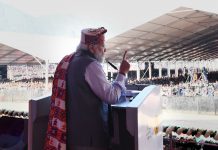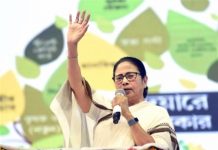
It is unfortunate that a credible think tank like @orfonline should allow this diatribe in absence of the person referred to. In #Kashmir we have done Journalism with pride and will continue to highlight what happens on ground,” the prominent journalist Shujaat Bukhari posted on Twitter hours before he was shot dead by the unknown assailants. The tweet was in response to a report by the Observer Research Foundation which criticised him for being a biased editor when it came to reporting Kashmir.
But the biased he never was. His paper Rising Kashmir was one of the most balanced publications in Kashmir. And, as is clear from his tweet, Bukhari was passionate about journalism. Despite having a battery of talented journalists running his paper, he was actively involved in every aspect of the publication. On June 14 too, he was at his office, instructing his staff as to the distribution of news across the pages according to their relative importance. But, he was especially mindful about the first ever UN report on the human rights situation in Kashmir released on the day and had asked his staff to give it a prominent display on the front page.
All seemed to be going well. Only days before he had returned from Lisbon where he had attended the World Editors Conference. He had pinned a picture of him outside the venue to his Twitter handle.
Bukhari was a globe-trotter. He would be all around the world attending conferences on Kashmir. And over the years, he had become an influential voice on the state which was heard and respected.
He had been active on the Kashmir journalism scene over almost three decades, joining the well-regarded English regional daily, Kashmir Times,as a reporter in early nineties, when militancy was at its peak. In 1994, he joined The Hindu as its Kashmir bureau chief and quit it in 2011 to set up his own newspaper.
Nobody has owned the responsibility for his killing. In fact, the militant organisation Lashkar-i-Toiba and the grouping United Jihad Council (UJC) have condemned the killing. The UJC chief, Syed Salahuddin, has demanded an international probe into the assassination.
“The killing of Shujaat Bukhari at a time when the UN human rights Commission released a report on the human rights abuses by Indian forces in Kashmir raises many questions,” Salahuddin said, in the statement.
Similarly, Lashkar chief Mehmood Shah has termed the killing “a conspiracy”.
“Killing of Shujaat Bukhari is a conspiracy hatched to suppress the voice of indigenous freedom struggle. Indian agencies have enmity towards every individual who is loyal to the freedom movement. The world must pay attention to India’s vicious and ill-fated conspiracies,” a spokesman of the outfit Dr Abdullah Ghaznawi said in a statement quoting Shah.
At the same time, condemnations have poured in from the mainstream and separatist political organisations. It is more or less a familiar scene that plays out after every high profile killing in Kashmir. And Bukhari’s is no different.
Police has released the CCTV picture of the three youth on a bike and appealed to people for their identification. However, it won’t be easy to do so. One of the youth in the picture driving the bike is wearing the helmet. One of the two pillion riders is thinly masked and another squeezed in between is carrying a bag, holding probably the weapons.
J&K Police has constituted a Special Investigation Team to probe the murder and will look at all possible angles to expose the conspiracy.
However, for the ordinary people, it is difficult to explain why Bukhari was killed. In his write-ups and the television discussions, he would stoutly defend Kashmir cause. And considering the record of the investigation into many such killings in the past, the murder is likely to remain a mystery.
letters@tehelka.com













